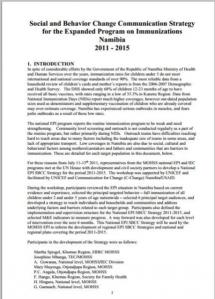SBCC Strategy for the Expanded Program on Immunization, 2011-2015 [Namibia]
The key behavior targeted by this strategy is: Complete immunization of all children under 2 and under 5 years of age nationwide.
Its target audiences are: mothers/caregivers, cross-border populations, the underserved/hard to reach/nomadic groups, and policy makers.
The strategy includes outlines for the following approaches:
- House to house approach in urban and peri-urban areas using the RED approach, including SBCC
- Community level promotion of Expanded Program on Immunizations (EPI)
- Mass media promotion of EPI
Source: FHI 360
Date of Publication: March 25, 2019
SIMILIAR RESOURCES
Tools
Examples
- Social Franchising: Improving Quality and Expanding Contraceptive Choice in the Private Sector
- Engaging the Private Sector in Maternal and Neonatal Health in Low and Middle Income Countries
- SBCC for Malaria in Pregnancy: Strategy Development Guidance
- How Businesses Can Invest in Women and Realize Returns
- The Public’s Role in COVID-19 Vaccination: Planning Recommendations Informed by Design Thinking and the Social, Behavioral, and Communication Sciences
- Integrated Management Strategy for Dengue Prevention and Control
- PAHO urges countries to maintain vaccination during COVID-19 pandemic
- Promoting Quality Malaria Medicines Through SBCC: An Implementation Kit
- Crisis and Outbreak Communication Pandemic Flu and Other Disasters
- Early Estimates of the Indirect Effects of the COVID-19 Pandemic on Maternal and Child Mortality in Low-income and Middle-income Countries: a Modelling Study
- Plan Strategique 2011-2015 de Lutte Contre le Paludisme au Burkina Faso
- National Strategy for Malaria Control and PreElimination 2011-2015, Lao People's Democratic Republic
- COMBI SBCC Communication Strategy for Integrated Community Level Malaria, TB, and HIV Prevention [Namibia]
- National Strategic Plan for Malaria Control and Elimination in Thailand, 2011- 2016
- TCCP 2011 Baseline Survey

